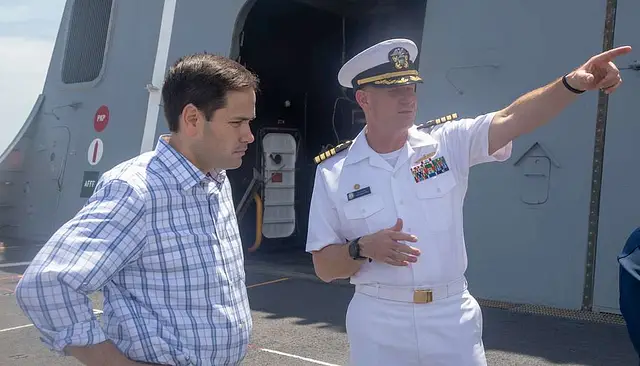Reporting has recently emerged that the United States is considering direct strikes on Venezuela that could increase volatility in the region and the risk of war.
Under the pretext of disrupting the flow of drugs into the United States by Venezuelan drug cartels, the U.S. has militarized the waters off the coast of Venezuela, flooding them with Aegis guided-missile destroyers, a nuclear-powered fast track submarine, P-8 spy planes and F-35 fighter jets. On September 2, American forces fired on a small speed boat that the U.S. claims was running drugs for a Venezuelan cartel.
The Donald Trump administration is yet to offer evidence for its claim. They have neither publicly identified who the eleven people who were killed on the boat were nor what drugs they were carrying. Congress has still not been briefed.
Secretary of State Marco Rubio said the boat was “probably headed to Trinidad or some other country in the Caribbean.” Trump says it was bound for the United States. Turns out, it was headed back to Venezuela.
U.S. officials familiar with the operation have now told The New York Times that, having “spotted the military aircraft stalking it,” the boat has already “altered its course and appeared to have turned around before the attack started.” The twenty-nine second video that Trump posted on social media spliced together several clips but edited out the boat turning around. Despite this lack of imminent threat, the aircraft, either an attack helicopter or an MQ-9 Reaper drone, “repeatedly hit the vessel before it sank.”
The Trump administration has claimed the right to supplant the National Guard and law enforcement with the military and lethal force on the grounds that the drug cartels are terrorist organizations who pose a threat to the national security of the United States because the drugs they bring into the country to kill Americans. The U.S. has invoked the right to self-defense, and Rubio has insisted that the speed boat was “an immediate threat to the United States.” Except that if it had turned around, it wasn’t.
Setting aside the legitimacy of the terrorist justification, if the boat had already turned around, the immediate threat argument is also blown out of the water. “If someone is retreating, where’s the ‘imminent threat’ then?” Rear Admiral Donald J. Guter, a retired top judge advocate general for the Navy from 2000 to 2002, asked the Times. “Where’s the ‘self-defense’? They are gone if they ever existed—which I don’t think they did.” Rear Admiral James E. McPherson, the top judge advocate general for the Navy from 2004 to 2006, added, “If, in fact, you can fashion a legal argument that says these people were getting ready to attack the U.S. through the introduction of cocaine or whatever, if they turned back, then that threat has gone away.”
The Trump administration has made it clear that the attack was not a one-time anomaly. Secretary of War Pete Hegseth said, “We smoked a drug boat, and there’s 11 narco terrorists at the bottom of the ocean, and when other people try to do that, they’re going to meet the same fate.” Since then, three more Venezuelan boats have met the same fate. Hegseth told U.S. troops on a ship in the waters off Puerto Rico that “What you’re doing right now—it’s not training.” He told them that they were on the “front lines” of a “real-world exercise.”
On a post on X (formerly Twitter), Hegseth told U.S. forces that, “It’s not if, it’s when. You’re on a mission…And the full power of the American military…will be used to ensure the American people are kept safe.”
Ken Klippenstein reports that, according to military sources, the Trump administration is considering further, and more significant, strikes on Venezuela. The strikes could take the form of either the shooting down of Venezuelan military aircraft or bombing Venezuelan military airfields. Such action could be taken in one of two situations: if Venezuela threatens the American forces off its coast or if Venezuelan President Nicolás Maduro does not enhance his administration’s efforts against drug cartels.
The first situation is a dangerous possibility, depending on the interpretation of “threaten.” Venezuela has twice flown F-16 fighter jets over the USS Jason Dunham. Though Venezuelan aircraft are likely displaying a show of defense, as the United States would, at least, do if there were foreign attack vessels off their coast, Trump said that if Venezuelan jets fly over U.S. Navy vessels again, “they’re going to be in trouble.”
The second raises, once again, the question of what Venezuela is to do. “The Venezuelan government’s collaboration in the fight against drug trafficking was among the best in South America,” according to former Executive Director of the United Nations Office on Drugs and Crime Pino Arlacchi. And now, on top of that, Maduro has ordered the more than doubling of Venezuelan forces to monitor drug trafficking. In addition to the 10,000 troops already deployed, the Venezuelan military is ordering an additional 15,000 “to determine and verify the absence of illicit crops” and to “to block this area also of possible drug trafficking.”
Despite Venezuela’s stellar past record and the current enhancing of its efforts, the United States is still threatening military action if Maduro doesn’t enhance his administration’s efforts against drug growing and trafficking.
What makes the question of what Venezuela is supposed to do more difficult is that there is nothing Venezuela can do. The U.S. is demanding that Venezuela make a course correction to correct a problem that does not exist.
The 2025 UNODC World Drug Report assesses that Venezuela “has consolidated its status as a territory free from the cultivation of coca leaves, cannabis and similar crops.” The report says that “[o]nly 5% of Colombian drugs transit through Venezuela.” The European Union’s European Drug Report 2025 corroborates the United Nations report: it “does not mention Venezuela even once as a corridor for the international drug trade.”
The Trump administration has offered no evidence that the destroyed speed boat was carrying drugs or drug smugglers or that it was on its way to American shores. Even if it was, it posed no immediate threat because it had already turned around and headed back to port. The Maduro government has already addressed American demands and increased its efforts against the drug growing and trafficking that was never a problem in the first place. None-the-less, the United States is threatening further military strikes on Venezuela, raising the hard to answer question of what Venezuela is supposed to do.

































